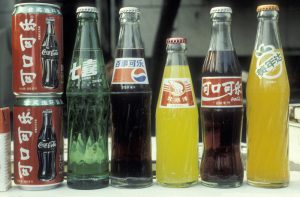

When Chinese Translations Gone Wrong: 5 Brands With Wrong Translations on Campaigns
Branding is essential for businesses and often a source of pride for owners. However, it can be a huge embarrassment for companies when translations go wrong, as these five examples show.
From wrongly translated slogans to misunderstood advertising campaigns, these brands provide cautionary tales for any business looking to do business in China.
When you’re marketing your product or service in China, it’s crucial to get the translations of your campaign materials right. So, before you launch your next marketing campaign, be sure to have it vetted by a professional translator!
1) Pepsi “Come Alive With the Pepsi Generation” Mistranslated into “Pepsi Brings Your Ancestors Back from the Dead”
This has got to be one of the most well-known examples of mistranslated slogans. To capture the youth market in China, Pepsi came up with this slogan: “Pepsi Brings Your Ancestors Back from the Dead.” The problem is that “Pepsi” in Chinese is interpreted as “Come Alive,” but it was mistranslated into “Pepsi Brings Your Ancestors Back from the Dead” on some of its posters.
The campaign had a massive failure, which shook Pepsi’s roots and changed its slogan to more appropriate wording for local audiences. However, even today, this iconic mistake has been etched into people’s memories and can still be found circulating on some blogs and forums.
2) KFC “Finger Lickin” Good Mistranslated into “Eat Your Fingers Off”
When you think of western brands with the worst translations on their campaigns, KFC’s would make a list because they failed to engage the youth market with their slogan ‘Finger Lickin’ Good.
A KFC ad that was targeted at young people included a slogan which read: “Finger Lickin’ Good,” and it was translated into Chinese as “Eat Your Fingers Off”. It’s like translating “My Way” into “Do It Your Way” what they meant to say was for the food to be finger-licking good, but it turned out to tell you should eat your fingers off. So now, apart from having their slogan so literal, they’ve also given a pretty graphic image of people eating their fingers! Yikes.
3) Mercedes Benz Used The Name Bensi Which Means “Rush to Die”
Mercedes Benz has always been known for its extravagance and style. It’s definitely what makes them stand out in the market, but the message they wanted to send across had an unfortunate turn with it, thanks to a bad Chinese translation of its brand name.
The company used the name “Bensi,” which means “Rush to Die.” It’s not something drivers will appreciate, right? The brand realized its mistake and rebranded the name and used “Benchi,” which means “Run Quickly as Flying.”
4) Apple’s iPhone 7 Was Translated as a Sex Organ in Cantonese
On September 7, 2016, Apple announced the iPhone 7 in San Francisco. Most of the international press releases were correct except for one thing that was overlooked when the name was launched in Hong Kong. When translated into Cantonese, it sounds like a slang of a male sex organ.
Of course, even the most prominent brands can’t escape these translation blunders. Samsung also experienced this when they launched the Note 7 in Hong Kong, to which the name was translated in Cantonese that sounded like a stick of the penis.
5) Coca-Cola’s Band Name Translates “Bite the Wax Tadpole” Initially
Coca-Cola had to change its Chinese name because it had no official representation of its name in Mandarin. It needed to find four Chinese characters whose pronunciations approximated “ko-ka-ko-la” sounds without producing a nonsensical or adverse meaning when strung together as a written phrase.
While Coca-Cola was searching for a good combination of symbols to represent their name, Chinese shopkeepers created signs using characters that sounded like Coke’s original formula but meant “bite the wax tadpole” or “female horse stuffed with wax,” which did not appeal to Coca-Cola.
Coca-Cola found the perfect combination of four characters in Chinese, retaining “ko-ka-ko-la” which means Ko’ to permit, be able, can, may, ‘Kou’ meaning mouth, hole, pass, Ko is the same as the previous one, and Le which means joy, to rejoice, be happy.
What Went Wrong?
These companies tried to appeal to international audiences with their branding and slogan but utterly failed, all because of the translation they received. The fundamental problem is that they were unaware of how different cultures think, act, speak or work. This leads us to believe that if these brands, considered big spenders, could make such mistakes (and some people would even say hilarious mistakes), what can we expect from small businesses that do not have the budget for hiring professional translators?
The impact on customers was very negative because silence speaks louder than words – many people didn’t want to associate themselves with these campaigns since they don’t represent them. It affected the marketing campaign itself, but it also affected brand image and awareness in China, which led to a lot of bad press and negative publicity.
Bad translations can cost you dearly, so whenever you plan to relaunch your campaign in another country or have it translated for international audiences, make sure you check with a professional translator and ask for recommendations from people around. This way, we can prevent such unfortunate mistakes from happening again and hopefully ensure that companies do not lose business because of poor translations.
Final Thoughts
While all of these brands likely had Mandarin or Cantonese speakers review their translations, sometimes things still slip through the cracks. The best way to avoid embarrassing translation fails like these is to work with a professional marketing agency specializing in Chinese translations and has native speakers on staff.
At LIMPID, we have years of experience translating English content into Chinese and ensuring that it sounds natural and accurate when read by native speakers. If you’re looking for help launching a campaign in China, contact us today for a free consultation. We would be happy to help you avoid any linguistic pitfalls!
 +1-877-574-2407 (US and Canada Toll Free)
+1-877-574-2407 (US and Canada Toll Free)  service@limpid-translations.com
service@limpid-translations.com





